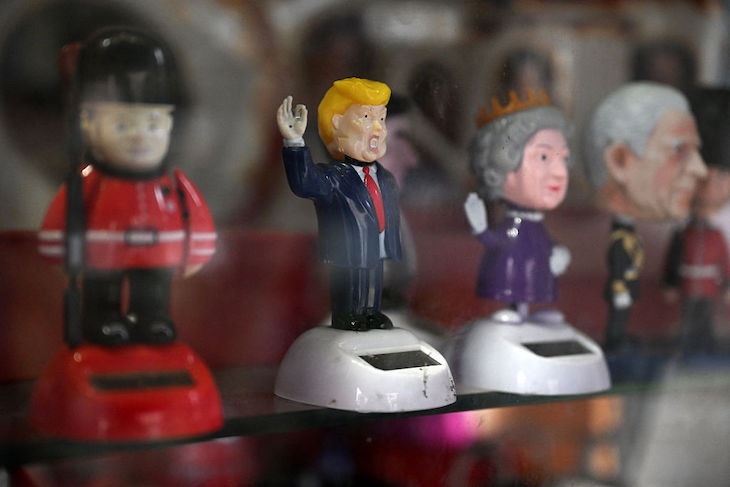The Donald is in Britain. As a holidaymaker used to budget flights, I associate Stansted airport, where Trump landed last night, with precisely the amount of glamour it currently offers, but I also know it was where planes in distress are directed to on their return – its long runway giving them the best chance of survival. Stansted is where imperilled dreams go in the hope of rescue. As Trump arrived, I realised its tarmac had not done for me what it once did for others. For them, that blessedly long runway was salvation. For me, it’s where my resistance crashed and burned. As I peered at the pictures of the US President emerging from his 747, his face set in that familiar absence of reflection, I realised something startling: I have come to value Trump.
This is not something I have faced lightly, willingly, or honestly. Like any person of sense, my distaste for the man’s character prevented any rational appreciation of his political impact. Trump is unlikely to make my Christmas card list, and his chances wouldn’t improve even if I had one. In his treatment of women, in his vanity and crudity, and in the mafia-boss malignity of his personal morals, the man is abhorrent. Which is why I resent – deeply – having come to approve of him.
I can hear the sound of dinner party invitations being withdrawn: the virtual rustling of electronic invites being electronically shredded. I accept that Trump has the instincts of an autocrat and the morals of a mobster. But Americans did not elect him – again – because they wanted to have him round to stay for the weekend; they elected him because they thought he was the best available option. I happen to believe they were correct.
Some of his opponents on the left regard Trump as a threat to democracy. For that, I am not without sympathy. But they don’t accept him as the product of democracy, which he certainly was. Democracy does not involve people electing the leader you know they should elect if they could see the world as clearly as you do; it involves giving them their own choice and honouring the result.
Our BBC – and it is ours, even if that’s now to our shame – appears to struggle with that. The assumption is that his electoral victories are explicable only by misinformation and the rise of fascism, not by rational people preferring his policies. This is a shame, because even if you disagree with those policies they deserve to be discussed. The considered choice of the American electorate should not be easily waved away.
Trump’s feeling that the media – what has come to be called the legacy media – are in hock to woke, and that they prioritise activism over reporting, seems to me correct. Much as I dislike him, Trump’s belief that Israel shares more Western values than Hamas and the Ayatollahs seems correct, as does his conviction that international agencies, from UNRWA to the WHO, need to be reformed or abolished. His assertion that the other members of Nato have coasted, and relied on the United States to fund their defense, offends my patriotism. But it is – damn it – objectively true.
Why did so many Americans vote for Trump? Those wanting insight into what many on the American right believe would do well to look at Oren Cass’s American Compass website, whose thoughtful arguments about policy – they made me understand the purpose of those Trump tariffs, in both their intent and their detail, as something far more reasonable than protectionism – are largely overlooked by much of the British media. Read them, and suddenly America’s support for Trump feels less like the inexplicable worship of a demagogue it gets presented as here. Cass makes the American dream, with its hard edges and gleams of promise, seem real even to me, a state employee with two cats and a job-for-life in rural Oxfordshire, who instinctively took Trump’s first election as a sign the world was ending.
I could forgive Trump for liking the occasional trip to Scotland, but a love of golf is unforgivable. About many of the parts of life which matter most, I don’t merely disagree with him, but find he represents everything I loathe. So I resent siding with Trump against my own media, and recoil still more at the grotesque twist that, at the next election, Farage might be presented as our own cut-price Trump. A man has his limits.







Comments